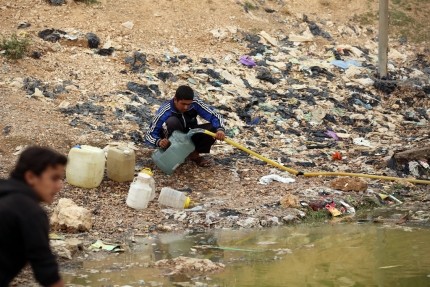
30 October 2017 – The Islamic State of Iraq and the Levant (ISIL or D’aesh) may be largely pushed out of Syria’s Raqqa governorate, but after years of oppression and nearly a year of intense fighting – marked recently by heavy airstrikes – humanitarian needs will continue to be large for some time, the top United Nations relief official told the Security Council Monday.
“Since the beginning of the anti-ISIL offensive in November last year, airstrikes and clashes have resulted in more than 436,000 people being displaced from Raqqa to 60 different locations, including in neighbouring governorates,” UN Emergency Relief Coordinator said briefing the Council via videoconference from Amman, Jordan.
“One conclusion is obvious: the impact of the Syria crisis continues to be profound.”
Expressing deep worry about the impact of fighting and airstrikes on civilians and civilian infrastructure in Raqqa governorate, with scores of civilians reportedly killed in recent months, he said he is also concerned for the safety and protection of civilians at risk from unexploded ordinance throughout Raqqa city, particularly those trying to return to their homes.
“Despite the directive issued by local authorities for civilians not to return to the city until it is deemed safe, the UN anticipates that people will go back to try to check on and protect their homes and their personal assets,” Mr. Lowcock explained.
Further to the east, in Deir Ez-Zor governorate, heavy fighting and airstrikes continue to result in civilian deaths and injuries. Large-scale displacement also continues, with the UN International Organization for Migration (IOM) reporting some 350,000 people displaced since August, including more than 250,000 people in October alone.
As for eastern Ghouta, Mr. Lowcock daily shelling has continued to be reported in recent weeks. Humanitarian access to eastern Ghouta – one of the four de-escalated areas where nearly 95 per cent of Syria’s besieged population lives – has been severely curtailed for months. Since the start of the year 110,000 people have received food assistance, out of an estimated population of nearly 400,000.
“Today the UN and partners delivered food, nutrition and health assistance to 40,000 people, he told the Council, warning however that an alarming number of child malnutrition cases have been recorded there, and more than 400 people with health problems require medical evacuation.
Overall, he said that more than 13 million people inside Syria still need humanitarian assistance. 6.3 million of them are exceptionally vulnerable and in acute need because of displacement, hostilities, and limited access to basic goods and services. “Conflict and violations of international humanitarian law continue to be the principal drivers of humanitarian need, with civilians in many parts of the country enduring massive suffering.”
“Against this background, the UN and our partners continue to implement in Syria one of the largest humanitarian operations in the world,” said Mr. Lowcock who is the UN Under-Secretary-General for Coordination of Humanitarian Affairs, noting, by example that in September, the World Food Programme (WFP) provided food assistance to more than 3.3 million people, the UN Children’s Fund (UNICEF) reached over 1.5 million people, and the World health Organization (WHO) reached over 800,000 people.
He also went on to point out that cross-border assistance provided for in last year’s Council resolution 2165 “has been a lifeline,” allowing the UN to reach millions of people in need in northern and southern parts of Syria. On average, aid was delivered to 2.76 million people a month through cross-border operations between January and August of this year.
“Our experience with cross-line operations from within Syria […] leads us to believe that it would be impossible to reach those people in a sustained manner from within Syria. I therefore regard a renewal of resolution 2165 as essential. Millions of people depend on the activities it mandates,” he underscored.
IF YOU WOULD LIKE TO KNOW HOW GAIN IS INVOLVED, CLICK HERE.
(Source)
(Image Source: UNICEF/UN066040/Souleiman)
Many Syrian IDPs (Internally Displaced People) first come to our partner’s building because someone tells them they can get a Bag of Blessing there. Each Bag of Blessing consists of food and non-food items. With the onset of winter, blankets and heaters were now added to each bag.
After individuals would come to the center and the volunteers and staff showed them love and kindness, the individuals usually became a part of the community. Often they kept coming, even if they no longer needed a Bag of Blessing.
Recently, a local staff member shared a story of a grandmother who first came to the center looking for aid…
“After some time, we learned that she had two little girls. They were her great-grandchildren, ages three and five. The reason why they were staying with her was because the girls came from a broken home. Their mother left them and their father did not work. They had no one to look after them. Their dad was also abusive toward the girls and it was a very bad situation.
The grandmother used the Bag of Blessing and took care of the girls. Her life was changed through that bag. I am thankful for this time because I had the opportunity to be able to see how God works through people.
She began to come every Saturday to share with me about her difficult circumstances concerning her grandchildren. At times, we were not always able to supply their needs, but I could see how God was working in her life, and how He was protecting these little kids from an abusive father.
Maybe the aid that we were able to give her gave the grandmother the strength to continue helping these little girls to have food and clothing, to grow, be healthy and warm.”
As of today, we are helping provide 1,000 families (totaling 5,000 individuals) with basic necessitites through the Bags of Blessings.
WOULD YOU LIKE TO HELP PROVIDE HOPE AND AID FOR ANOTHER PERSON SUCH AS THIS GRANDMOTHER AND HER FAMILY?
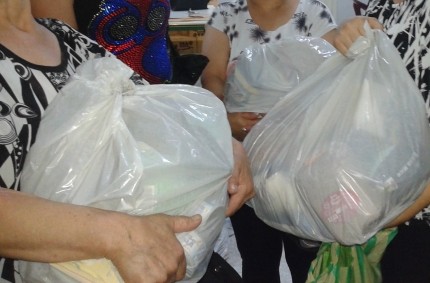
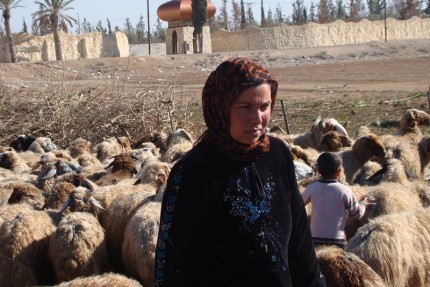
23 July 2015 – Syria’s food production in 2015 remains at 40 per cent below its pre-crisis levels, impacting the price of bread, which has spiralled by 87 per cent, and shrinking poultry production by half, according to a United Nations agency report released today that warns that “the risk of irreversible damage to the children is real, with tragic future consequences.”
“The evidence is clear: almost five years of conflict have destroyed the Syrian economy and the people’s ability to buy essentials like the food they need to survive,” said Arif Husain, chief economist of the UN World Food Programme (WFP).
The UN Food and Agriculture Organization (FAO) and the World Food Programme (WFP) said in their special joint report based on a crop and food security assessment mission to Syria that the 2015 wheat crop is expected to be better than the 2014 drought stricken harvest, but is still 40 per cent lower than pre-conflict production levels and “will not lead to significant improvements in the overall household food security situation.”
Some 9.8 million people in Syria are food insecure, with 6.8 million of these “severely” food insecure – a level of need that requires external food assistance, according to the report, which noted that since January this year alone, more than half a million people have been displaced.
“Although Syria’s current harvest is better than expected due to abundant rains, the country’s agriculture sector remains decimated by the conflict. Urgent donor support is needed to ensure farmers can meet the upcoming cereal planting season, beginning in October,” said Dominique Burgeon, Director of FAO’s Emergency and Rehabilitation Division.
The report said agricultural production continues to be impeded by shortages of fuel, farm labour and agricultural inputs, including seeds and fertilizers; high input costs and unreliable quality; as well as damages to irrigation systems and farming equipment.
Livestock production is also gravely affected by the conflict, the agencies said.
“The sector, once a major contributor to Syria’s domestic economy and to its external trade, has seen reductions of 30 per cent in cattle and 40 per cent in sheep and goats, while poultry, usually the most affordable source of protein in people’s diets has shrunk by 50 per cent,” according to the report. “The report also noted that the country’s veterinary service is rapidly running out of vaccines and routine drugs.”
And after being relatively stable in 2014, food prices began increasing sharply in early 2015 in the wake of lower government subsidies and exchange rate depreciation, the report noted.
“Critically, the price of bread has spiralled in the past year, increasing by up to 87 per cent in public bakeries,” it said.
The report said families were found to be spending more than half of their incomes on food and in some places such as Sweida, Aleppo and Hama this share is higher and has jumped to almost 80 per cent in Dara’a, one of the areas which have witnessed some of the most intensive fighting.
While an end to the conflict remains the main precondition for ensuring that people in Syria have adequate access to food, the FAO-WFP report recommends that in order to strengthen the resilience of affected communities, the establishment of village-based private seed production and distribution centres, promoting backyard vegetable and poultry production through distribution of improved seeds and chicks, as well as providing livestock vaccines and veterinary drugs.
“We worry about the continued displacement and its impact particularly on women and children,” said the WFP economist, Mr. Husain. “The risk of irreversible damage to the children is real, with tragic future consequences if this conflict lasts much longer.”
IF YOU WOULD LIKE TO KNOW MORE ABOUT GAIN’S RELIEF EFFORTS, CLICK HERE.
(Article Source)
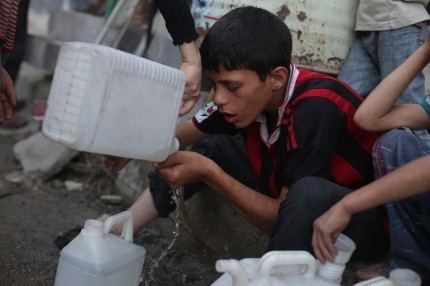
13 July 2015 – Syrian children are becoming increasingly vulnerable to water borne illnesses amid peaking summer temperatures and dwindling supplies of safe water, the United Nations Children’s Fund (UNICEF) warned today.
“The situation is alarming particularly for children who are susceptible to water borne diseases,” Hanaa Singer, UNICEF’s Representative in Syria reported in a press release. “With the crisis now in its fifth year, water has become even more scarce and unsafe, and poor hygiene conditions especially among the displaced communities are putting more children at severe risk.”
Since the beginning of 2015, said the UN agency, Syria has reported 105,886 cases of acute diarrhoea while also registering a sharp increase of Hepatitis A cases.
The situation is particularly dramatic in Deir-Ez-Zour, a city not far from Syria’s border with Iraq, where raw sewage has reportedly contaminated the Euphrates River from which the local population receives its water. As a result, UNICEF added, some 1,144 of typhoid cases have been reported.
“Since the beginning of the crisis, we’ve been working with a range of partners to support the vital water infrastructure on which some 15 million people in Syria depend,” Ms. Singer continued. “This includes drilling and equipping wells as alternative sources of water as well as supporting the local production and procurement of water treatment supplies.”
The conditions in Syria have steadily been deteriorating since the outbreak of the country’s conflict in March 2011.
The UN’s Office for the Coordination of Humanitarian Affairs (OCHA) has cautioned that some 12 million people in the Middle Eastern country today remain in need of humanitarian assistance – a twelve-fold increase since 2011. 7.6 million people have been displaced by the conflict and another 4.8 million people are in need of humanitarian assistance in hard to reach and besieged locations.
The humanitarian impact of the crisis is only further compounded by funding shortfalls which has seen wholesale cuts to the UN’s delivery of humanitarian aid – from food assistance to lifesaving health services.
IF YOU WOULD LIKE TO KNOW HOW WE ARE MEETING THE NEEDS OF SYRIANS, CLICK HERE.
(Source)
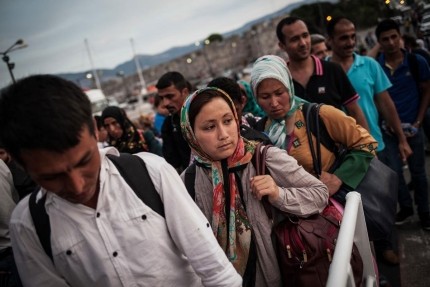
9 July 2015 – The exodus spawned by the four-year long Syrian conflict has now become the United Nations refugee agency’s largest crisis in almost a quarter of a century and risks deteriorating even further as fighting in the country shows no sign of abating.
In a news release issued earlier today, the Office of the UN High Commissioner for Refugees (UNHCR) confirmed the latest figures received from the field indicating that more than 4 million Syrian refugees have fled the Middle Eastern nation since hostilities began there in March 2011.
“This is the biggest refugee population from a single conflict in a generation,” lamented UN High Commissioner for Refugees António Guterres. “It is a population that deserves the support of the world but is instead living in dire conditions and sinking deeper into abject poverty.”
As it reaches the mid-point of its fifth year, the Syrian civil war has generated a steady outflow of refugees into neighbouring countries such as Lebanon, Turkey, Iraq and Jordan, burdening those countries’ infrastructures and leading to overcrowded settlements where many refugees struggle amid high unemployment and precarious services.
According to the latest data available, Turkey alone is host to over 1,800,000 registered Syrian refugees – more than any other in the world – with about 259,000 living in 23 camps set up and managed by the Government.
In addition, the numbers are only slated to increase amid intensified fighting across Syria, the UN refugee agency noted. Today’s 4 million milestone, in fact, comes barely 10 months since the total of three million was reached.
At the same time, however, life for Syrians in exile is becoming increasingly tough. The UN agency explained that some 86 per cent of refugees outside Jordanian resettlement camps live below the poverty line. In Lebanon, 55 per cent of refugees live in shelters considered to be “sub-standard.”
Meanwhile, in a recent report from the ground, the UN Children’s Fund (UNICEF) similarly warned that as the Syrian crisis has dramatically reduced family livelihood opportunities and impoverished millions of households in the region, children have been steadily pushed into the job market and are now being widely employed in harmful working conditions, risking serious damage to their health and wellbeing.
“Worsening conditions are driving growing numbers towards Europe and further afield, but the overwhelming majority remain in the region,” Mr. Guterres continued. “We cannot afford to let them and the communities hosting them slide further into desperation.”
While the conflict continues to push a steady outflow of Syrians across the region, the conditions of those trapped inside the country’s besieged cities remains equally dire.
The UN’s Office for the Coordination of Humanitarian Affairs (OCHA) has cautioned that some 12 million people in the Middle Eastern country today remain in need of humanitarian assistance – a twelve-fold increase since 2011. 7.6 million people have been displaced by the conflict and another 4.8 million people are in need of humanitarian assistance in hard to reach and besieged locations.
The humanitarian impact of the crisis is only further compounded by funding shortfalls which has seen wholesale cuts to the UN’s delivery of humanitarian aid – from food assistance to lifesaving health services.
IF YOU WOULD LIKE TO KNOW ABOUT GAIN’S WORK IN SYRIA, CLICK HERE.
(Source)
